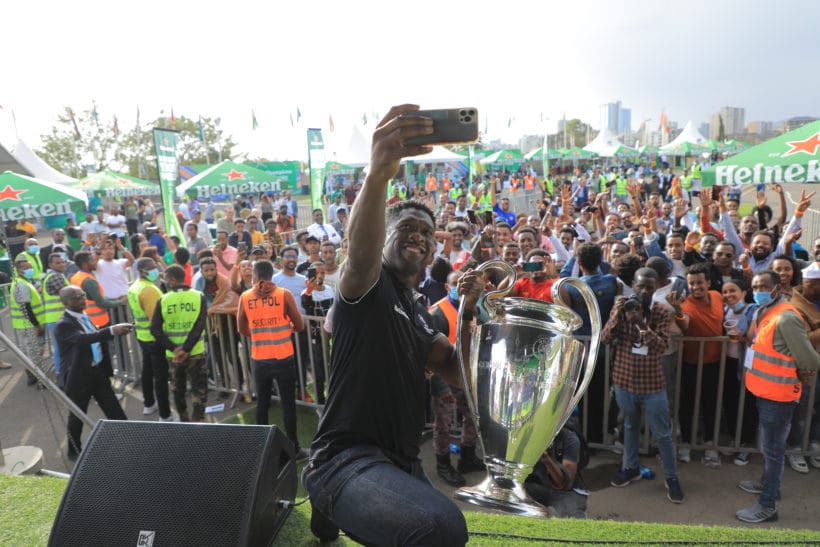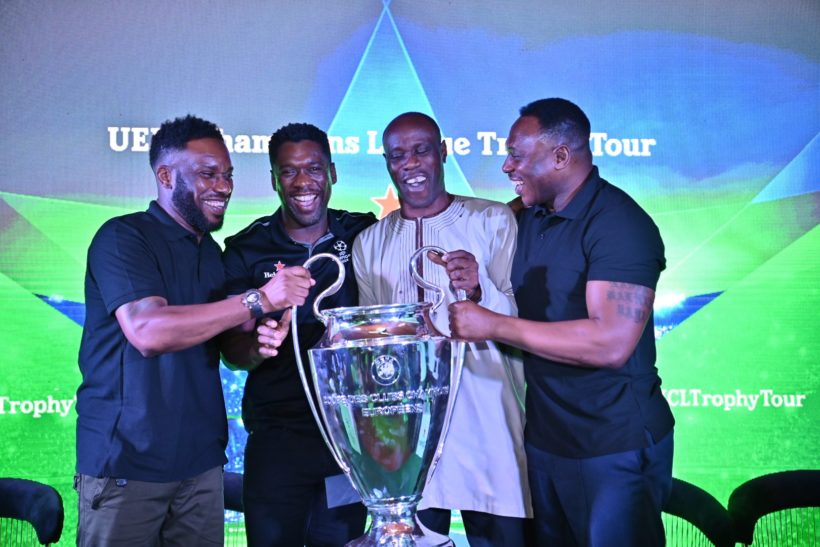The world’s second-largest brewer is using sports and entertainment to connect with young African consumers as investment and volume growth skyrocket.
Tiger, the leading international premium brand in Asia, has become the fastest-growing beer brand in Africa’s largest economy, almost doubling sales volume last year. Tiger is one of the brands helping Heineken, the world’s second-largest beer maker, penetrate the most populous country on the African continent, which has about 200 million people, most of whom are under 30 years of age.
‘‘Tiger continued its successful roll-out in Nigeria, making it the third biggest Tiger market globally and the biggest outside the Asia Pacific region,” Roland Pirmez, President Africa, Middle East, and Europe, said. Driven by the increasing adoption of Tiger, the volume of the company’s premium brands jumped 30% in Nigeria, supported by strong growth in Heineken and the successful launch of the Desperados brand in the country.
An increase in digital penetration in Nigeria due to faster internet speeds and smartphone usage is helping boost the sales of Tiger and other Heineken brands in the West African nation. Heineken’s digital business drive accounted for 75% of net revenues in 2021.
Sales on the company’s digital platform worldwide grew by 130% in 2021 to 2.8 billion euros and are on track to hit 10 billion euros in 2025, it said in a statement. The platform is now operational in 30 markets including Brazil, Italy, France, Cambodia, and Egypt as well as in Nigeria where it helped drive sales.
While Nigeria and other African countries may have lower disposable income relative to others, they represent a sizable population that is growing fast, making them a big opportunity for beer in the long term.
‘’The Nigerian beer market remains attractive given its high growth potential and an improving macroeconomic environment,’’ Pirmez said.
It is not only in Nigeria that the Heineken brand is seeing a surge in sales. Across the continent, sales have rebounded strongly from the pandemic induced slowdown in 2020 “stronger and faster than predicted.” Nigeria recovered strongly from its worst recession in four decades, with the economy growing by 4% driven by a rebound in consumer demand and the non-oil sector in Africa’s largest economy just like many African economies did after the 2020 slowdown.
“Overall 2021 saw total volume exceeding 2019 levels driven by the performance in many markets across the region, especially Nigeria and the Democratic Republic of Congo’’, Pirmez said. International and local premium brands witnessed strong performances in Nigeria, South Africa, Russia, Ivory Coast, and Rwanda, Heineken said.
This is why Heineken is pouring more investment into the continent, an indication of its growing confidence that Africa represents the next growth frontier. The average age on the continent is below 25 years, and the average beer per capita consumption is just around 22 litres, compared with an average of around 78 litres in developing markets. That gives a lot of headroom for expansion capacity, which Heineken is already doing.
Nigeria benefited from the 1.8 billion euros spent on expanding capacity in five countries in 2021, including Brazil, Vietnam, Italy, and Australia. Heineken commissioned the first solar photovoltaic plant to power the Ibadan Brewery plant in Nigeria, which will supply about 800 MWh to the brewery annually, reducing its carbon footprint on the continent by 10,000 tonnes.
The beer maker is also investing in other parts of the continent to take advantage of the growing population, investing over $250 million into the continent in 2021. It unveiled a $100 million brewery in Mozambique, an $11 million brewery in Congo, and a $119.5 million factory near Addis Ababa in Ethiopia. And the Dutch brewer is using pop culture, driven by music, film, social media and sports, to enlist a generation not afraid to be authentic.
Other global players are also seeing potential on the continent as it rebounds from the pandemic. Google, which opened its first artificial intelligence center in Ghana in 2019, has pledged to invest at least $1 billion over the next few years. Microsoft is also investing in Africa with the Microsoft Africa Development Center (ADC) and the Microsoft Africa Research Institute (MARI) in Nairobi, Kenya. The ADC is planning to invest $100 million in new tech within the first five years, while MARI uses AI cloud tech to improve productivity.
Facebook is investing heavily in infrastructure to help more people connect to the internet and is seeking to do this by investing in 2Africa, an undersea cable system set to be the largest in the world.
‘‘There’s never been a better time for brands to align their interests with those of young Africans’, says Tunji Adegbite, whose company, Naspire, provides business research for brands on the continent. ‘‘Yes, they want to drink beer and have fun, but they’re also passionate about sports, music, and fashion as well as film and arts. Only the brands who demonstrate they care about these things will win today and in the future”. And that’s what Heineken has done with Tiger, Radler, and Desperados.
Uniquely, sports has been one of the most successful strategies that Heineken has adopted to drive sales and market penetration in Africa by connecting with lovers of football on the continent. Almost 20 years since it began by sponsoring the popular European soccer tournament, the Champions League, Heineken executed, this year, the most elaborate Champions League trophy tour on the continent, with visits to the Democratic Republic of Congo, Mozambique, Ethiopia, and Nigeria. Fans from Rwanda and Congo Brazzaville also attended the tour in Nigeria and DRC respectively.
The tour was headlined by Clarence Seedorf, the first and only player to have won the UCL with three different clubs — Ajax, Real Madrid and AC Milan; who was joined by African legends Austin ‘Jay Jay’ Okocha, Taribo West, Davido, Daniel Amokachi, and others.
With an estimated 60% of Africa’s population under 25 and the youth population expected to be twice the population of Europe by 2100, sports and entertainment have become a great platform to connect on the continent. Burna Boy, the Grammy winner and multiple nominee is an ambassador for Heineken’s brand Star Lager Beer, while football legends like Okocha and Amokachi are regular advocates. The company sponsors fashion shows and festivals and holds the record for the longest-running music concerts on the continent.
‘‘When you look at the history of brands like Heineken in Africa, the reason they connect so well locally is because they understand and speak the language. They know what the people want and they meet that need; in the process, they build cultural significance and have an impact beyond their actual business. It’s a concept all African entrants need to understand if they want to win here.’’

Meanwhile, the African continent is known for its passion and drive for the game of football. An estimated 400 million Africans tune in to watch European football matches weekly, especially those featuring the most followed teams on the continent – Real Madrid, Chelsea, Manchester United, Arsenal, Liverpool and Barcelona. The growth and success of football professionals from the continent such as Senegal’s Sadio Mane, Egypt’s Mo Salah and Algeria’s Riyad Mahrez have further fuelled this interest and passion for European football. On Champions league football game nights, streets and bars are filled with cheers at every strike of a goal.
It was, therefore, no surprise that UEFA and Heineken embarked on the biggest tour of the UCL trophy in Africa – The first tour of the trophy since the global COVID-19 pandemic. Getting close to and experiencing the much-coveted UCL trophy is indeed an exciting opportunity for many African football fans.
With the presence of Dutch and AC Milan football legend, the UEFA Champions League trophy toured the cities of Kinshasa in the Democratic Republic of Congo, Maputo in Mozambique, Addis Ababa in Ethiopia and Lagos and Abuja in Nigeria. Fans from Congo Brazaville and Rwanda were also taken on an experience of the tour in DRC and Nigeria respectively. Clarence Seedorf. With the tour coinciding with the quarter-finals stage of the 2021/2022 Champions League season, football matches featuring the likes of Chelsea, Real Madrid, Manchester City, Liverpool, and Bayern Munich further heightened the trophy tour excitement.

Heineken is the world’s most international beer, sold in up to 192 countries. The brand has been a sponsor of the UEFA Champions League since 2005, providing an opportunity for soccer fans to enjoy exceptional football and merry with the best beer brand.
Seating with a bottle of Heineken beer while watching a champion league match is a common sight in various football viewing centres across Africa, so much so that the brand is called the Champions league beer. It is also a warm feeling to see football fans involved in debates after a champions league match has ended over some bottles of Heineken beer.
For UEFA, wooing fans across the world has become even more important given the threat of losing relevance as portrayed in the case of the ‘Super League’. In 2021, 12 top European clubs — including Manchester United, Liverpool, Arsenal, Barcelona, Real Madrid and Inter Milan — attempted a breakaway European “Super League” to court their loyal fans with the promise of top quality football. The move caused a massive outrage from fans, players, club managers and influential personalities like British Prime Minister Boris Johnson, French President Emmanuel Macron and ex-footballer David Beckham criticizing the idea. Heineken offered its support for UEFA and the UEFA Champions League with a witty social post – “Don’t Drink and Start A League”, which went viral and further sent fans into a frenzy.
The African continent is one of the most populous regions in the world, with over 1.3 billion people as of 2018, which accounts for about 16% of the world’s human population. The African continent is seen as a potential market for the competition to grow and for the beer brand.
Football is the most popular sport in Africa with an estimated 400 million Africans regularly tuning in to watch the UEFA Champions League every season.
Considering the population of the continent, drive, and passion for sport, UEFA and Heineken hence, partnered to take the prestigious UEFA Champions League trophy on a tour of Africa with the objective of inspiring a new generation of African football fans and an appreciation of their love for UEFA Champions League and Heineken.
The tour also sought to build a stronger affinity for Heineken with consumers across Africa, bringing the UEFA experience closer to the African community.
Above all, Heineken has used this tour as a medium to celebrate the passion of African football fans.

